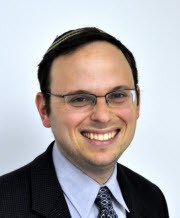By Rabbi Adam Starr
Mental Illness is no less an Illness than physical Illness. The Halacha is clear in the laws of fasting on Tisha B’av that a person who is sick need not fast.
וכן חולה שהוא צריך לאכול אין צריך אומד אלא מאכילין אותו מיד דבמקום חולי לא גזרו רבנן:
"A person who is sick who needs to eat does not need an assessment, but rather may eat immediately because in cases of illness, The Rabbis did not decree a Fast"(S.A O.C 554:6)
The reason given for this exemption is important. The decree to fast on Tisha B’Av never applied to a person who is sick. People who must eat on Tisha Bav for health reasons often think that since they are not fasting, they are not really observing Tisha B’av. This is not true at all, a person who is in the category as “choleh” is observing Tisha B’av exactly the way halacha wants them to be doing so. There is also a mistaken idea that there needs to be a “heter” given from the rabbi. There is no need for a rabbi to give dispensation for something clearly permitted. (The whole idea of rabbis giving a heter is a misunderstanding of how Halacha works but that’s another conversation)
It’s also essential that we publicize that the definition of Choleh (a person who is sick), also applies to mental illnesses that could negatively be affected by fasting. This is especially the case with those suffering from eating disorders. I therefore fully endorse the opinion of Rabbi Yoni Rosensweig in which he posted: “I would like to make clear my opinion, that someone who suffers from anorexia should not fast. It doesn’t matter whether s/he is currently battling it, or whether s/he battled it in the past and has been well for years and years. Anorexia should be treated like an addiction – even one fast can trigger it, and the consequences of anorexia can be lethal.”
Mental Illness is often a hidden Illness and unfortunately too often still comes with shame and stigmatization. Our communities need to do a better job of raising awareness of these issues and supporting those affected and their families. Rabbis also need to educate themselves on the issues at play with different forms of mental illness, to properly incorporate them into Halachic decision making.
During this season of communal darkness, we pray that those facing personal darkness soon experience the light of healing.
 Shared By Rabbi Adam Starr
Shared By Rabbi Adam Starr
Ohr Hatorah Congregation in Atlanta, GA
Originally posted by Rabbi Starr on his personal Facebook Page

